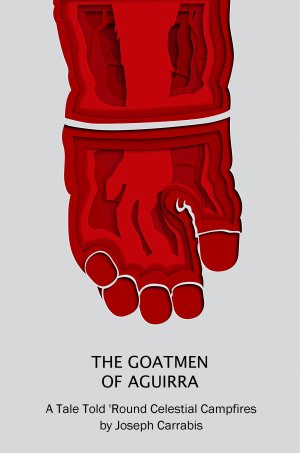The Goatmen of Aguirra is one of my favorite stories and, based on comments, popular among my readers (thankee!). It appears in my self-published Tales Told ‘Round Celestial Campfires, as an individual ebook The Goatmen of Aguirra: A Tale Told ‘Round Celestial Campfires, and was serialized in Piker Press in 2019.
I’m sharing it here because a friend is having some challenges using 1st Person POV, and The Goatmen of Aguirra uses 1st Person POV throughout.
Read The Goatmen of Aguirra, Part 11.
Hope you enjoy.

The Goatmen of Aguirra (Part 11)
The translator is failing so I use it sparingly. The recorder I use because I can. I will take a guess and record the date as 916015.
Funny how much lighter these units have become without The Merrimack to power them. The mists cleared. The earth is churned more than before due to the leaping and running of the young billies. Most of the elder billies have gone, as have all of the young. There is no more rumbling. I peer over the edge of the Tower and make out the bodies of those who didn’t make it.
Tenku is staring at me.
“What happened here? What was this?”
He grabs my genitals. I don’t know if that is the answer, but it is the only response I get.
He doesn’t seem surprised by them. I am surprised at the gentleness of his touch. They must seem a child’s, weak and ineffective in his hands. How did an ancient Hebrew oath right find its way here, I wonder.
Back in the village, Hepob offers me the same porridge as when I arrived. It tastes slightly different and I see scrapings of the black root in it.
After I eat, I rest.
I slept long and deeply, yet my sleep was fogged by dreams as thick as the altiplano’s Aguirran gnats. I no longer know how reliable or intelligible this redaction has become.
I remember several dreams, although only a few clearly. In one, I was back at the ship. Sanders, Galen, Tellweiller, and Nash walk through me and past me as if I don’t exist, nor can they hear me even though I scream at them. The Old Ones have advanced. The Merrimack was called home.
In one dream, I watched Galen and Tellweiller on one of Dave’s C3I monitors, then realized I was Dave watching the monitor. This wasn’t a common dream, where you know who you are and have a sense of yourself no matter what you are in the dream. Here, I was more a passenger along for the ride; not David Sanders, but able to experience his environment, thoughts, and emotions along with him. Not a pleasant journey. He seems a lonely, fearful man.
On the monitor, I watched Tom ask Bob if he’d like to join him in a little exploring. “Care to come along?” I sat with Dave in C3I as they finished lunch in the Common. Dave tapped in the commands for a two-way screen split and zoomed a separate window onto each man’s face. His eyes, always quick, looked down and over his nose at the images on the screen. They went out of focus momentarily and he “hmmed”, bridging his fingers against his mouth and nose. His eyes still out of focus, he titled his head back further, just enough so he could see the tip of his nose in the foreground of their faces. This is an unconscious habit he has when talking to people.
As the two men cleaned up their table and left the Common, Dave adjusted the Eyes to follow them out of the ship. They hadn’t travelled far when they stopped. Without even looking for any remotes or robotics, they fell into each other’s arms, laughing and giggling, pulling off their suits and, making themselves comfortable against each other, finally … finally I looked away, not so much embarrassed as wanting to afford them their privacy. My only thought was “How could they have kept this secret so long?”
Greetings! I’m your friendly, neighborhood Threshold Guardian. This is a protected post. Protected posts in the My Work, Marketing, and StoryCrafting categories require a subscription (starting at 1$US/month) to access. Protected posts outside those categories require a General (free) membership.
Members and Subscribers can LogIn. Non members can join. Non-protected posts (there are several) are available to everyone.
Want to learn more about why I use a subscription model? Read More ch-ch-ch-ch-Changes Enjoy!

